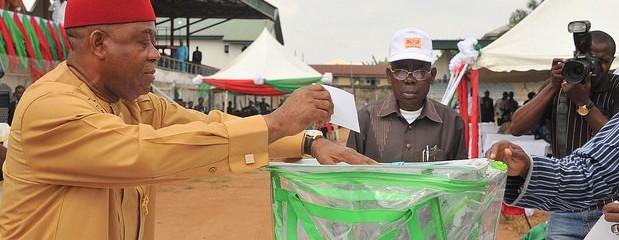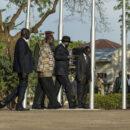Nigeria’s contentious court rulings reveal need for electoral reform

The Court of Appeal’s recent string of rulings on disputed elections have raised accusations of political interference.
Nigeria’s presidential election in March 2015 was widely viewed not just as a historic moment for the country – as an incumbent was defeated for the first time since 1999 – but also as free and fair. The same, however, could not necessarily be said of the governorship and state assemblies elections that followed the next month.
In many of those April polls, there were allegations of irregularities. Violence and acts of political subversion were documented in Taraba, Imo and Abia states. Meanwhile, in Rivers State, international observers called for the result’s cancellation and the candidate for the now ruling All Progressives Congress (APC) declared that “no election took place“.
Last month, Nigeria’s Court of Appeal, the final arbitrator in such cases, began making judgments regarding the validity of these disputed elections and ended up annulling many of the outcomes.
On 17 December, the Court nullified the Akwa Ibom State governorship election, which had seen Udom Emmanuel from the now-opposition Peoples Democratic Party (PDP) declared the official winner. A few days later, the Court affirmed the removal of Nyesom Wike (PDP) as governor of Rivers State, calling for new elections to be held within 90 days. And on 30 December, the Court ruled that another PDP governor, Okezie Ikpeazu, had been wrongly deemed the victor in Abia state, declaring the All Progressives Grand Alliance (APGA) candidate the official winner instead.
The Court of Appeal has also made judgements regarding the election of ten senators so far, with seven PDP candidates and three APC nominees having their victories nullified. Several elections for the House of Representatives have also been overturned.
Politics or justice?
Although the Court of Appeal has ruled against the ruling APC in some instances, the fact that the now opposition PDP has suffered the most from the judgements has led some to accuse the decisions of being politically motivated.
PDP spokesman Olisah Metuh has described a “heinous plot by the APC government to use the judiciary and various security agencies to reverse the victories of the PDP”. Meanwhile, Ekiti State Governor Ayodele Fayose has talked of a “seeming collaboration between the APC-led Federal Government and a section of the judiciary”, going as far as to claim the situation was “worse than corruption that the president claimed to be fighting”.
This may not just be sour grapes. Nigeria’s Chief Justice Mahmud Mohammed has on various occasions spoken of political pressure on the judiciary and in March last year claimed that there were “unpatriotic citizens” bent on using the courts to manipulate the electoral process. Earlier this month, Mohammed raised some concerns about the electoral rulings too – especially regarding instances in which the Court of Appeal disagreed with the judgements of lower courts – and reminded his counterparts that justice has to be done but also be seen to have been done.
On the other hand, many in Nigeria see the rulings as a fair reflection of the irregularities during the polls. After all, there were many allegations the then PDP government attempted to influence the elections illegitimately, with accusations that a slush fund accrued from the proceeds of oil sales had been set up and that security agencies were being used in favour of the party in key states.
Some observers also note the independence of the courts in Nigeria’s political system.
“The courts have proven they are independent and the President stands by his word that he will not interfere in the process,” Bashir Ahmaad, a member of President Buhari’s media team, told African Arguments. Meanwhile, breaking with some in his party, PDP senator Ben Murray-Bruce said: “The judiciary is shielded from controls and influence of the state and I have confidence in the Nigerian judiciary.”
Yet others argue that the truth may fall somewhere in between the two usual interpretations.
“These judgments are a validation of the reports of local and foreign election monitors. They confirm a generally held view that the elections were marred with irregularities,” says Lagos based lawyer, Jiti Ogunte, but nevertheless concedes that “if PDP were still in control of the Federal Government, the judgments might have been rendered differently”.
Safeguarding democratic progress
State elections in Nigeria are often very high stakes, with governors set to control of budgets sometimes running into billions of dollars and members of the National Assembly reportedly earning annual salaries of over $1 million. And with so much to lose or gain, it is little wonder the elections are so hotly contested and court rulings regarding polls’ validity so significant.
Given this, while many may disagree over the Court of Appeal’s recent rulings, those on both sides of the aisle can find consensus in the assertion that the country needs a more efficient, independent and non-contentious mechanism for judging elections when disputes arise.
Indeed, Attahiru Jega, former chair of the Independent National Electoral Commission (INEC), has called for an Electoral Offences Court to be created due to what he called “the perceived slowness of the conventional court system”. Similarly, Auwal Rafsanjani, executive director of Civil Society Legislative Advocacy Centre (CISLAC), has advised the government to urgently overhaul INEC in order to “ensure sanity in the electoral system and restore confidence of the Nigerian voters”.
Along with the many other tasks in Buhari’s in-tray, it seems electoral and judicial reform is yet another pressing priority necessary to consolidate Nigeria’s democratic progress and the citizenry’s trust in the country’s institutions.
Lagun Akinloye is a Nigerian journalist and political analyst. Follow him on twitter at @L_Akinloye.





The electoral tribunal, appeal courts and other courts in Nigeria today are in the pockets of APC and Muhamadu Buhari and whatever they tell the courts to deliver will be delivered hook-line and sinker. Example, the supreme courts had severally ruled that nomination of candidates for election is the priority of the political parties. Yet the Tribunal in Taraba state ruled infavor of APC against the long ruled precedent that has been laid by the supreme court. The disobedience of court orders by the APC and Muhammad Buhari proofs that the courts in Nigeria are in the pockets of APC and Buhari.
How do you obey court order when you believe you’re the commander-in-chief and everybody including the institutions were supposed to obey you and not the other way around? That’s the position Buhari found himself. African military and their military leaders don’t know how to obey civil authorities, it’s not just Buhari but the only difference here is that his own might be getting a bit worse too soon, Obasanjo bullied many and disobeyed a number of court rulings during his time too. Forget about Buhari claiming to be a born-again democrat, he still sees himself as a military leader and he acts like one, simple as that!
the journalistic style is commendable
cialis generic cialis 20 mg
buy cialis usa https://cialiswithdapoxetine.com/